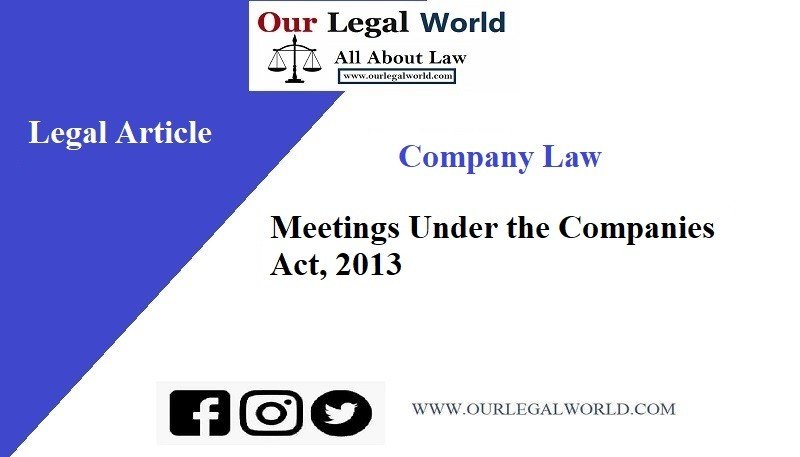Meetings under Companies Act, 2013
Introduction
A meeting is generally a gathering of the members of a company; a meeting plays a very important role in the overall functioning of a company. A meeting must be constituted by two persons at least but under exceptional circumstances it can be done by one.
Annual meetings have to be conducted by the companies to discuss the business affairs of the company apart from this various other meetings can be organized by a company depending upon its needs. Meetings provide a fair opportunity to the members of a company to put forward their opinion so that decisions can be taken based on them. Every meeting conducted by a company must be recorded properly and every meeting have to be registered before the registrar of companies within 30 days.
Kinds of Meetings
The meetings under the Companies Act, 2013 can be classified into the following
Annual General Meeting
Section 96 of the Companies Act 2013 talks about Annual General Meeting. A Company has to hold its very first Annual General Meeting within 9 months form the end of the financial year. A one-person company is exempted from holding an Annual General Meeting.
Example- a Company has been incorporated on 10/10/2017 it has to conduct its first annual general meeting within 31/3/2018 and not beyond that. But if a company has been incorporated on the same year in which the financial year is ending then certain relaxations are provided. If the company has been incorporated on 10/2/2018 then there is no mandate that the company has to conduct its meeting by 31/03/2018 it can conduct its meeting between 1st April 2018 to 31 March 2019 but not beyond that.
After the very first Annual General Meeting the subsequent meetings have to be conducted within 6 months from the ending of the financial year. The gap between two annual general meetings must not exceed 15 months, if the company fails to conduct the meeting within the prescribed time then the registrar of companies must be informed and if he thinks fit then he can grant an extension of 3 months but not beyond that.
Date, Time and Place of meeting- An annual general meeting has to be called within the Business Hours which are from 9 am to 6 pm excluding the national holidays. It has to be held in the registered office or in any other location in the same city or town where the registered office is located. If a company does not comply with the provisions related to meetings shall be liable under Section 99 of the Companies Act, 2013.
Extra Ordinary General Meeting
There are some issues in a company which sometimes require immediate action and the members cannot wait for the Annual General Meeting so to address immediate issues extraordinary general meetings can be called. Section 100 of the Companies Act 2013 states that an extraordinary general meeting can be called by the company. It can be called by the following.
- By the Board- As per Section 100(1) of the Companies Act the board can call for an Extra Ordinary General Meeting and it can be held at any part of the country.
- On Requisition of the members – As per Section 100(2) on request of the members the board can conduct such a meeting. In case of a company which deals with share capital members having 1/10th of the share capital can make a request and in case of a private company who have 1/10th of voting power can make the request. The notice for the request has to be written and duly signed by the members who are placing such a request. The Board has to reply or proceed to call a meeting with 21 Days of such a request and with 45 days of requisition a meeting has to be conducted.
- By Requistionist– If the board does not conduct a meeting within 45 days of requisition then the members who had made the request can conduct the meeting within 3 months from the date of request made. The Requistionist need to provide a notice of 21 days before the date of to the company and to the members who will be joining the meeting. When a meeting is organized by the Requistionist there is no requirement of an explanatory statement under Section 102 of the Companies Act.
- By Tribunal– Section 98 of the Companies Act 2013 states that the tribunal can call for a meeting on its own or any member can also request the tribunal to conduct an extra ordinary general meeting. The meeting can be conducted in a manner as the tribunal deems fit.
Class meeting
A class meeting is another form of meeting which is restricted to a particular class of members in a company, for example, a group of small shareholders can call for a meeting and it shall be restricted only to them no other members will be allowed to attend it.
Notice of a meeting
Under Section 101 of the Companies Act, 2013 21 days of notice has to be given by the company before conducting a meeting. The Notice must be in written form and it must contain the time, date and the venue of meeting. In case of Section 8 companies the notice has to be of 14 days. The notice have to be served to every member, directors , auditors, debenture holders, shareholders and all the Key managerial persons along with their relatives or legal representative if required.
Explanatory Statement
Section 102 of the Companies Act, 2013 states that an explanatory statement along with the notice has to be attached the statement shall contain the nature of the business meeting, details regarding the appointment of directors or auditors, it shall also contain details of the resolutions for special business. Every material fact regarding the meeting has to be stated in that statement.
Quorum of meetings (Section 103)
Quorum is the minimum number of members which are required to be present so that the meeting can be conducted.
In case of a public company if the total number does not exceed 1000 then 5 members are required for the quorum and if the company has total members exceeding 1000 but not exceeding 5000 then 15 members are required for quorum and if the total number exceeds 5000 then 30 members are required for quorum.
If the quorum has not been formed then within half an hour of the meeting it shall be cancelled or it will be rescheduled on the next week on that same day.
Proxies (Section 105)
A proxy is a person who is appointed by a member to attend and vote in a meeting in the absence of a member. Proxies are not allowed to speak at the meeting they can only vote and they do not constitute a quorum. In Case of Section 8 companies only a member of the company can be made proxy on behalf of another member. The instrument appointing the proxy i.e. MGT 11 has to be submitted 48 hours before the meeting and it has to be signed by the appointer.
Minutes of the Meeting
As per Section 118 of the Companies Act, 2013 minutes of the meeting has to be properly drafted. It is a written document which shall contain all the details regarding the business transaction all details of resolutions and everything. The minutes of the meeting has to be signed by the Chairman of the meeting. The meetings have to be registered through MGT 14 before the registrar of companies with 30 days of such a meeting.
Some Cases on Meetings of Company
- Queens Kuries and Loans Pvt Ltd vs. Sheena Jose [1993 76 Com Cases 821 Ker]
In this particular case the director of a company who was associated with a resolution was not provided any notice for the meeting, the Court held that whatever decision has been taken in the proceeding shall be invalid.
2. B Mohandas vs. AKMN cylinders Pvt ltd. [1998 93 Comp Case 532 CLB]
In this particular case it was held that the Requistionist cannot go to the tribunal at the very first instance under Section 98 of the Companies Act, 2013 to call for a an extra ordinary general meeting if the Requistionist themselves have not conducted a meeting after that. At first they need to exhaust their remedy.
Conclusion
The meetings in a company play a vital role in the overall growth and management of companies. Meetings have to be conducted by the companies within the specified time limit and have to be duly registered before the Registrar of Companies otherwise the company can be held liable.
References
- Company Law by Dr. Avtar Singh.
- Elements of Company Law by ND Kapoor
- Guidelines for Conducting Extraordinary General Meetings under Company Law, blog-ipleaders-in.cdn.ampproject.org
- Company Law Bare Act with Rules of 2019
Written by: Amrusha Sengupta Edited by- Ankita Roy
Also Read: Formation and Incorporation of a Company







![Tax Law Internship at Legum Attorney [Chamber of Ashish Panday], Delhi : Apply by 15th May 2025](https://www.ourlegalworld.com/wp-content/uploads/2025/05/IMG_0113-min.png)

